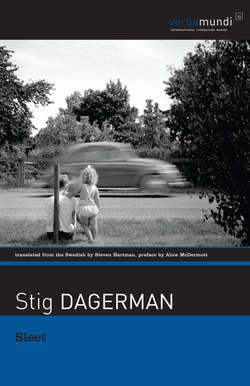Читать книгу Sleet - Stig Dagerman - Страница 11
На сайте Литреса книга снята с продажи.
Salted Meat and Cucumber
ОглавлениеWhen I was nine years old and supposedly small for my age, the way to school passed by a creek with yellow, muddy water. In the winter you could stand there on the bank and throw stones until the golden ice cracked. But in summer, spring, and fall the creek became a race course for matchsticks, corks, and matchboxes – the matchsticks always won because the corks and matchboxes would get stuck between the rocks. Once my friend Inge and I found two fat, ugly lampreys squirming around on the bottom. We stuffed them in a sandwich bag and took them home. But nobody wanted them. So we had to throw them back in the river. I hope they lived. In those days our knees were always scraped, the scabs forever fresh and soft. And just when they had begun to heal, a brewery truck would almost always come down the road that you just had to tow behind, or a new log jam would form in the river that you just had to run across.
Yes, the road to school was filled with adventures – not so much on the way there, but on the way home. The rich old farmer had an apple orchard with bitter, green fruit. And there was an old abandoned house that eventually became a chapel. Birds flew around in the dark under its broken roof, shingles had fallen in and covered the floor, and everything – the steps, the doors, the warped window frames – everything was rotten in a way that equally frightened, tickled, and enchanted.
And then, of course, there were the old women of the district, always dressed in black, whom you could usually see walking through the trees toward some old roadside shack. To us, people were never as old as they were in those days – a couple hundred years was just barely middle-aged.
And there were other things, too, forbidden things which we could never really know for sure, simply because they were forbidden. And yet the unawareness was but a myth, for if ever there was a time when life was filled with sticky symbolism, it was then. Almost everything we did had double meanings. If you threw a stone at a girl out of pure mischief, the act would certainly be interpreted as something else altogether.
One time on the hillside by the river we found an old deck of left-behind cards half-destroyed by the rain. Only the queen of spades was still in fairly good shape, and I remember very well the many different ways this could be interpreted by those of us who were more experienced.
When the washtubs simmered on the bank of the river, we would steal matches from the wood pile and light them up in the dark behind some barn wall. This gave us a gruesome pleasure which somehow made life even more doubly complex than it already was. I remember my friend Inge once took a single match to an entire box of stolen matches. When it burst into a hissing flame he flung it out through the air and into the creek. And I remember thinking what a terrible sin it was to waste something you had just stolen. No, we were never as moral as we were in those days.
To us, the most important bits of knowledge often came in whispers. In the hallway at school, terror had a way of sinking its claws into you, because that’s where you were often pointed out by some secret whisper that could be followed from mouth to mouth. And the strangest thing about it was that you never got to know what your own secret was all about. It could be whispered of someone that his house was infested with lice, or of someone else that she had peed in her pants in class and had to stay in during recess to clean it up. But of my own supposed offences I was never once allowed to hear.
